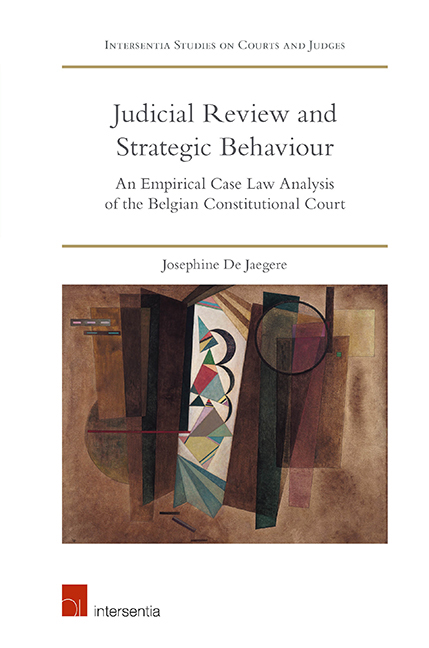 Judicial Review and Strategic Behaviour
Judicial Review and Strategic Behaviour Book contents
- Frontmatter
- Foreword
- Acknowledgements
- Contents
- Introduction
- PART I NORMATIVE FRAMEWORK: THE DELIBERATIVE PERFORMANCE OF CONSTITUTIONAL COURTS
- PART II THE CONTOURS OF JUDICIAL DECISION-MAKING
- PART III EMPIRICAL ANALYSIS OF THE BELGIAN CONSTITUTIONAL COURT'S CASE LAW
- Conclusion
- Codebook
- Bibliography
- Index
- About The Author
Foreword
Published online by Cambridge University Press: 26 June 2019
- Frontmatter
- Foreword
- Acknowledgements
- Contents
- Introduction
- PART I NORMATIVE FRAMEWORK: THE DELIBERATIVE PERFORMANCE OF CONSTITUTIONAL COURTS
- PART II THE CONTOURS OF JUDICIAL DECISION-MAKING
- PART III EMPIRICAL ANALYSIS OF THE BELGIAN CONSTITUTIONAL COURT'S CASE LAW
- Conclusion
- Codebook
- Bibliography
- Index
- About The Author
Summary
This is a book on the Belgian Constitutional Court and the dynamics of its judicial decision-making. It is an empirical study of the judgments rendered by this Court, revealing the strategic considerations at play, and as such is inextricably linked to the specific context of the Belgian political system.
Yet this book is so much more, and is of interest beyond Belgian borders. This is due to its contribution to more general debates in the two disciplines that it, very proficiently, combines: legal scholarship and empirical legal studies. The global value of this book – beyond the insights it offers to observers of the Belgian legal system – is therefore threefold.
First, the book contributes to the ongoing legal debate on constitutional review and the counter-majoritarian difficulty. To this end, the author views constitutional courts as deliberative institutions which provide a forum for deliberation between governments and stakeholders. In this way, it also contributes to the debate on how constitutional review is best shaped, pointing out the inherent qualities of abstract review by centralised courts from the perspective of deliberative democracy. At the same time, jurisdictions contemplating the introduction of a constitutional court can learn from this book which aspects of constitutional engineering should best be taken into account. Overall, the author is very clear in revealing how the Constitutional Court goes about making its judgments acceptable to the parties, politicians and the wider public, and how this is reflected in judicial reasoning.
Second, the book constitutes a contribution to empirical legal studies. In this discipline, much research is devoted to the factors that determine the outcome of judicial decisions. Whilst these types of studies are more commonplace in the US, this constitutes a germinal approach in Europe. In these studies, political and strategic factors have been the centre of attention, but the legal factor is often carelessly set aside. It has even been held that judicial reasoning serves as a justification ex post to hide what is actually going on. One reason is that legal factors are difficult to measure; another reason is that empirical scientists are often not familiar with legal reasoning and how it is intertwined with politics. In contrast to preconceptions in empirical science, political and strategic factors do not necessarily rule out the legal variable; the author, with her legal background, is well aware of that.
- Type
- Chapter
- Information
- Judicial Review and Strategic BehaviourAn Empirical Case Law Analysis of the Belgian Constitutional Court, pp. v - viPublisher: IntersentiaPrint publication year: 2019
